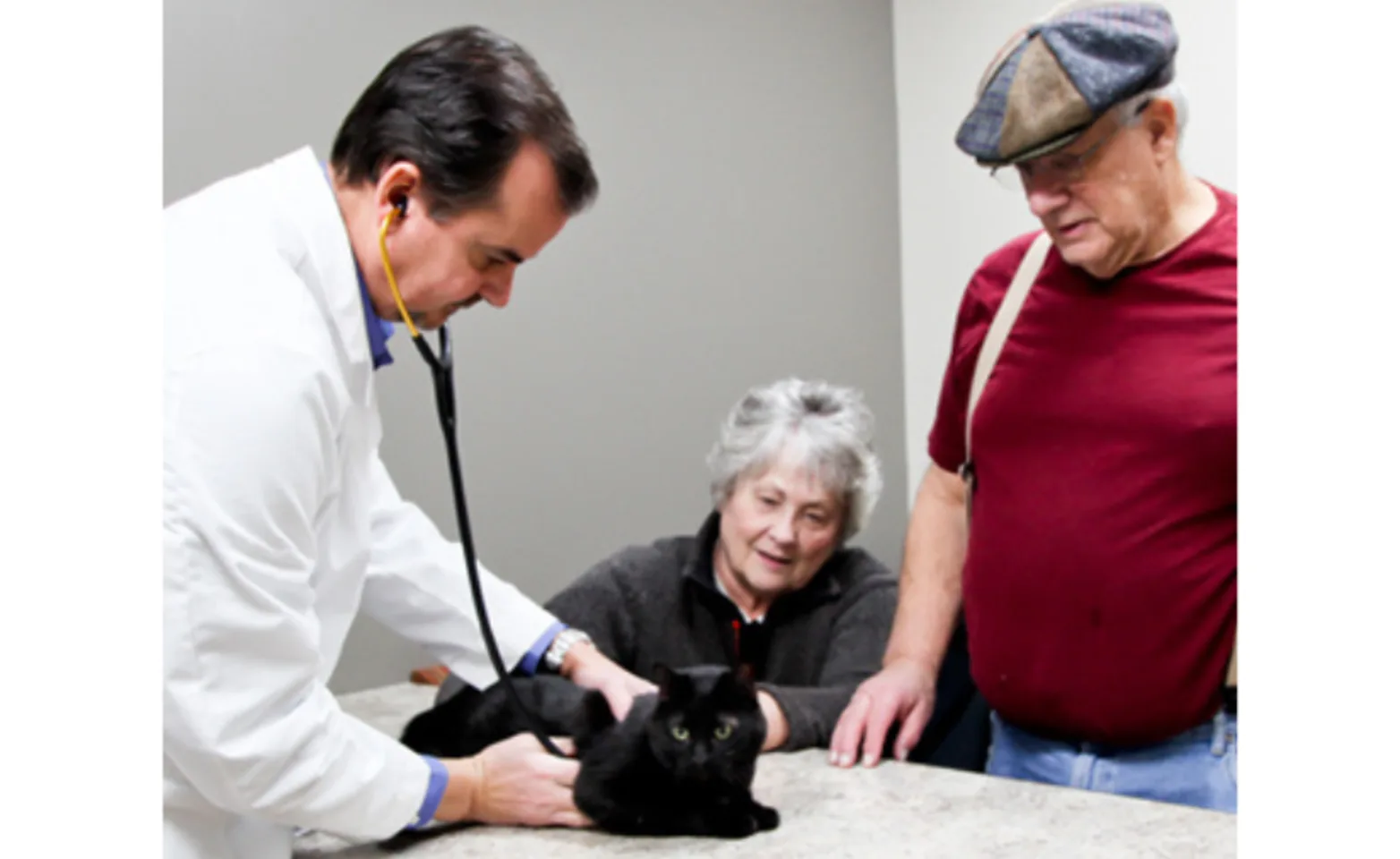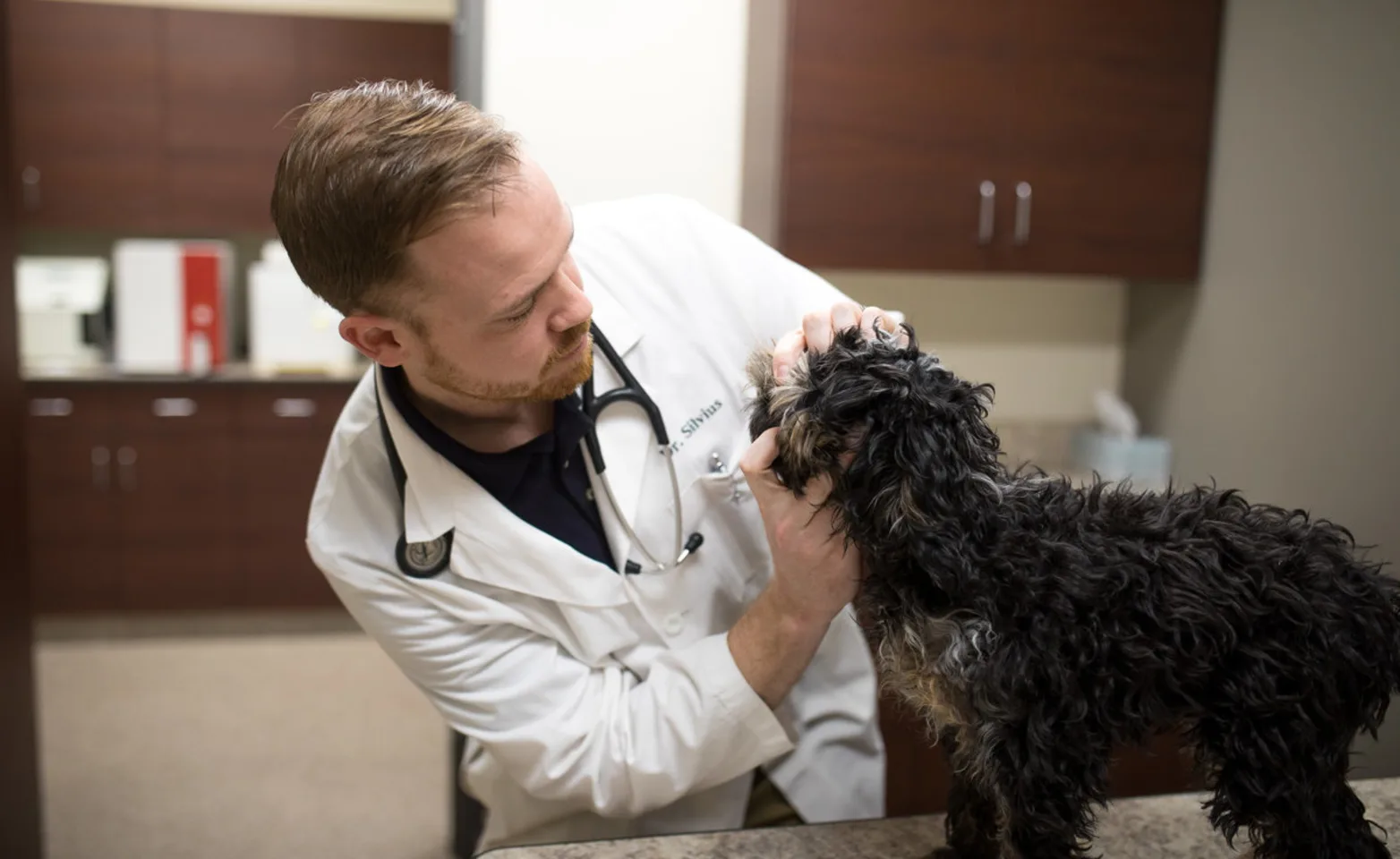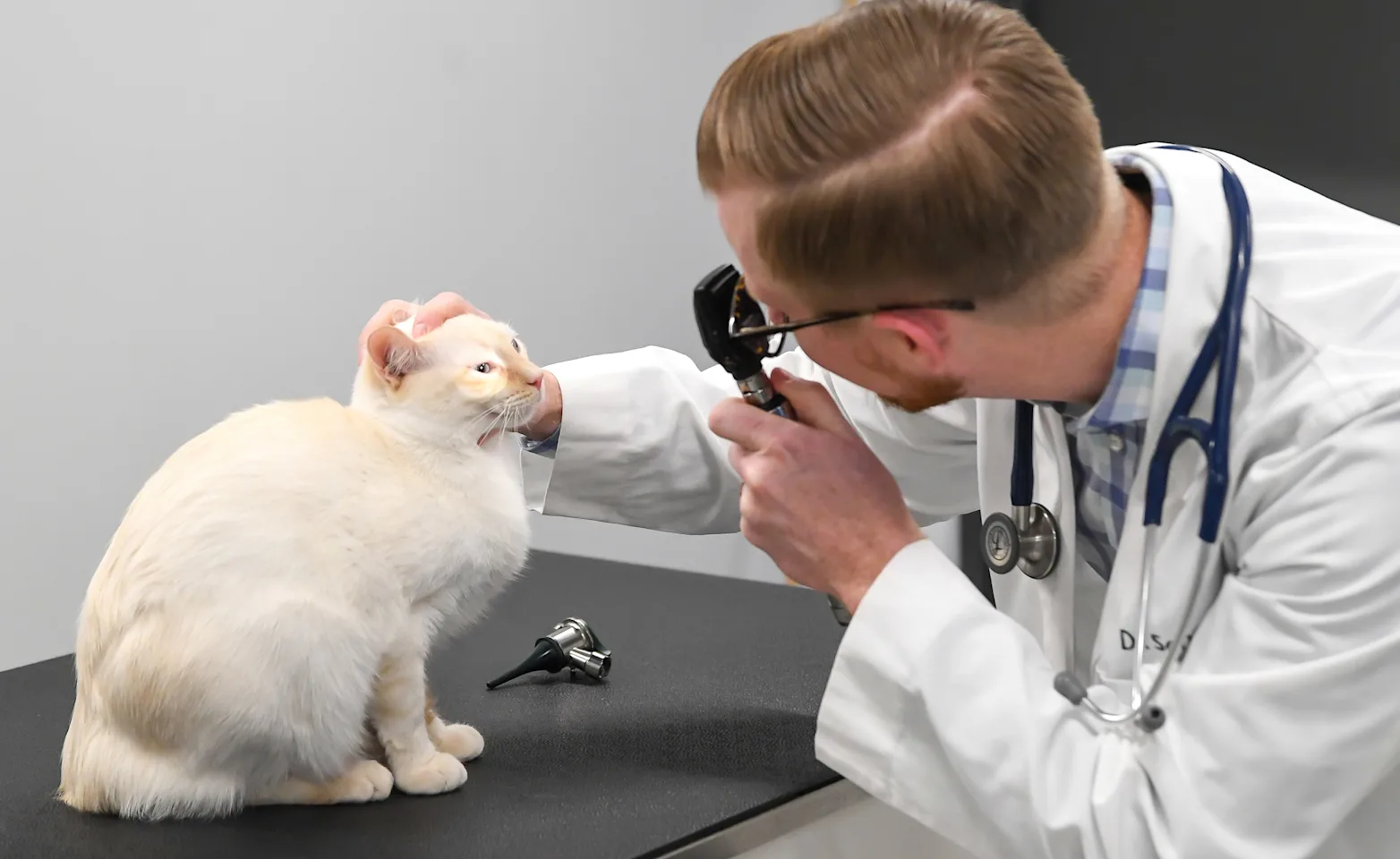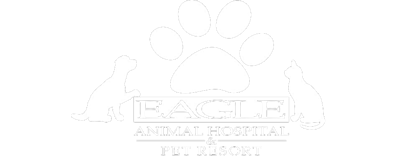Eagle Animal Hospital
Benefits of Wellness Care
At Eagle Animal Hospital in Kansas City, our veterinarians and medical staff recommend annual pet wellness examinations for the same reason your personal physician or dentist recommends them — if a health problem or issue can be detected in its early stages, there is a far greater likelihood it can be resolved and treated with less difficulty, less expense, and greater success.
Early detection of health problems, illnesses, and age-related issues.
Preventative care such as flea and tick prevention, heartworm disease, and more.

Dental examinations to ensure their teeth and gums are healthy.
Nutritional guidance for weight management and general health.
Routine vaccinations to prevent common pet illnesses.
Senior care wellness programs tailored to your pet’s needs.
Consult with your vet about any health or behavioral concerns you have for your pet.
Receive vet recommendations for specialized care or pet surgery for any health issues.
Comprehensive Examinations
A comprehensive physical examination helps your veterinarian evaluate your pet's health and make informed decisions about your special companion's veterinary care. In addition to a complete physical for your pet, the exam is also an opportunity for you to discuss any concerns about your pet's health or behavior with your veterinarian. If you've observed any changes in your pet's body weight, appetite, water intake, urination and bowel habits, and/or activity level, this is the time to mention them. Changes may be signs of medical problems. Seemingly insignificant lumps and bumps under the skin may be indications of infection or cancer. Common painful conditions, such as ear infections, abscessed teeth, or gum disease may not become noticeable until seriously advanced. Catching these conditions early will lead to a happier, healthier pet and ensure his or her greatest chance of living a long life.
What's Included in a Pet Wellness Exam
Perform a Head-to-Tail Exam to Asses Their Whole Body Health
Listen to Their Heart and Lungs and Check Their Pulse
Recommend Additional Testing Based On Assessment
Examine Their Teeth and Gums
Observe Their General Body Condition, Movements, and Behaviors
Assess Lymph Nodes, Legs, and Abdomen for Any Abnormalities
Perform Vaccinations and Prescribe Annual Medications/Preventative Treatments
Core vaccines for puppies and dogs
DAPP (Distemper, Adenovirus, Parainfluenza, and Parvovirus), Leptospirosis, Rabies, and Bordetella.
Core vaccines for kittens and cats
FVRCP (Feline Rhinotracheitis, Calicivirus, Panleukopenia) and Rabies. We also recommend FeLV (Feline Leukemia).
What's included in a Pet Wellness Exam?
Annual wellness checks are essential to your pet's health. During an exam, your veterinarian will:
Perform a head-to-tail exam to assess their whole body health
Examine their teeth and gums
Assess lymph nodes, legs, and abdomen for any abnormalities
Listen to their heart and lungs and check their pulse
Observe their general body condition, movements, and behaviors
Perform vaccinations and prescribe annual medications/preventative treatments
Recommend additional testing based on assessment
If your pet's due for their annual wellness exam, contact Eagle Animal Hospital to schedule today!
Senior Pet Wellness
Thanks to advances in veterinary medicine, pets are living longer than ever. Senior animals make wonderful pets and companions; however, they have different medical needs from puppies and kittens. Pets age faster than people and are considered to be seniors around age seven, so once your pet has reached this age we recommend at least one physical examination per year, though more frequent pet exams are encouraged. During this examination, we'll perform tests that can detect the signs of heart disease, infection, diabetes, and other health problems.
Heartworm Prevention
Heartworm disease is a serious, life-threatening disease affecting dogs and, to a lesser extent, cats. It is a concern for pets throughout Missouri, as the disease is easily spread by infected mosquitoes. Clinical symptoms of heartworm disease develop very slowly. Lack of energy and exercise intolerance are early symptoms, as are coughing and difficulty breathing. Because heartworm disease is increasing in frequency and is a serious and deadly disease, we recommend an annual heartworm test for dogs.
Heartworm disease prevention is simple and effective. For dogs, a once-a-month heartworm preventative can be given as a tasty, chewable treat. This same chewable medicine prevents not only heartworms from developing, but also kills and prevents most other types of worms that can infect your dog. Cats are protected by applying a drop of heartworm prevention liquid to their skin once a month. We recommend this to prevent heartworm disease as well as fleas, ear mites, and other types of worms that can infect your cat.
If you would like to have your pet tested for heartworm disease, or if you would like additional information on how best to protect your pet from this dangerous parasite, please call Eagle Animal Hospital and Pet Resort today or reach us online for an appointment. We can discuss which product will best fit your pet's needs.
Leptospirosis
Leptospirosis is a disease that infects dogs, humans, and other animals. The organism that causes the disease is a type of bacterium called a spirochete. Leptospirosis is spread by recovered animals that shed the spirochete in their urine for months to years following infection. Exposure to the disease usually occurs in the environment from contaminated water, food, soil, or vegetation. The Leptospirosis organism penetrates through the interior lining of the mouth (mucosa) or through injured skin. Wild animals, especially rats, are carriers of the disease.
Symptoms of Leptospirosis begin to appear about 1-2 weeks after exposure. Signs associated with the disease are fever, depression, vomiting, and a reluctance to move. Loss of appetite, dehydration, and weight loss are also noticeable symptoms. This bacterial infection can cause severe life-threatening damage to the liver and kidneys even after treatment with antibiotics and supportive care. For puppies, a series of two boosters administered 3-4 weeks apart is required for full immunity. Yearly booster vaccines are required to keep immunity at a proper level.
For more information about our pet wellness services or to schedule your pet's next wellness appointment, please contact Eagle Animal Hospital today at (816) 880–9500.
Laser Therapy
Reducing pain and promoting healing is one of our medical team's top priorities. To that end, we have invested in a Class IV therapeutic laser, which we use on our patients following orthopedic surgery or an injury and to help manage a range of chronic and acute conditions.
During each treatment, the energy from the laser increases circulation, drawing water, oxygen, and nutrients to the damaged area. This creates an optimal healing environment that reduces inflammation, swelling, muscle spasms, stiffness, and pain. In addition, it can accelerate tissue repair and cell growth, improve circulation and nerve function, reduce scar tissue formation, and help the immune system fend off infection. Laser therapy causes no adverse effects on healthy cells.
Pets typically do not need to be sedated for laser therapy treatments and the experience is usually pleasant and comforting. As the injured area returns to normal, the function is restored and pain is relieved, allowing your pet to quickly return to his or her normal activities.

Services Include:
Pet glaucoma screening
Diagnostic testing
Disease management, including diabetes, Cushing’s disease, Addison’s disease, kidney disease, and hyperthyroidism
Pet Glaucoma Screening
Glaucoma is a common condition in which the fluid pressure inside the eye increases, resulting in damage to the optic nerve, followed by loss of vision and blindness. There are two types of glaucoma. Primary, or chronic, glaucoma is hereditary or develops as your pet ages. Secondary, or acute, glaucoma develops as the result of an injury or illness. As secondary glaucoma can progress rapidly, it is considered an emergency situation.

Glaucoma Symptoms
Redness in the eye
Tearing or discharge
Eye sensitivity to light
Pain
Cloudy-looking eye
Bulging eyeball
At Eagle Animal Hospital in Riverside, our veterinarians highly recommend routine glaucoma exams as part of your pet's regular wellness care. The exam is not only an effective screening measure for chronic and acute glaucoma, it can also help set a baseline measurement of your pet's normal intraocular pressure (IOP). Establishing an IOP baseline is important because the normal measurement can vary between species, breeds, and even individual pets. Screening is simple and noninvasive. Although it shouldn't cause your pet any pain or discomfort, we apply a mild anesthetic eye-drop to ensure your pet is comfortable during the exam.
Should we uncover any additional problems with your pet's eyes, our veterinarians are skilled in performing a variety of ocular services and surgeries, including cherry eye repairs, entropion surgeries, and treatment for uveitis and corneal scratches or ulcers.
